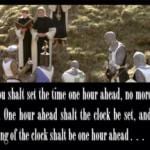This tweet definitely seemed to me to be worth sharing with a wider audience:

That tweet came in response to another tweet which said (citing Fee and Stuart) “The text cannot mean what it never meant.” That in turn was in response to a use of that principle by John Walton, who wrote:
If we read modern ideas into the text, we skirt the authority of the text and in effect compromise it, arrogating authority to ourselves and our ideas. This is especially true when we interpret the text as if it is making reference to modern science, of which the author and audience had no knowledge. The text cannot mean what it never meant. What the text says may converge with modern science, but the text does not make authoritative claims pertaining to modern science (e.g., some statements may coincide with Big Bang cosmology, but the text does not authoritatively establish Big Bang cosmology). What the author meant and what the audience understood place restrictions on what information has authority. The only way we can move with certainty beyond that which was intended by the Old Testament author is if another authoritative voice (e.g., a New Testament author) gives us that extension of meaning.
—The Lost World of Adam and Eve, p. 19
That was quoted by Jim Spinti, who didn’t entirely agree with the point as worded. I appreciate his point about the capacity for a text (I’d say any text and not just a biblical one) to take on meaning beyond what it could possibly have meant to its author and/or earliest readers.
Of related interest, Andrew Perriman blogged about the idea that the gospel can be summed up in terms of “Jesus loves me this I know, for the Bible tells me so…” See also this post from a while back on Jesus Creed:














